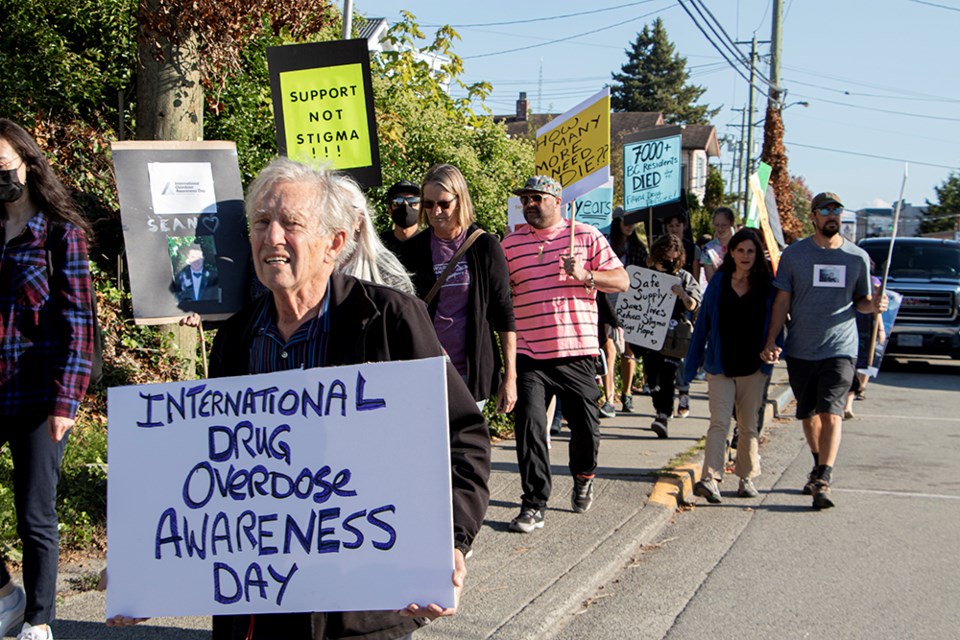Approximately 60 people gathered outside Powell River City Hall on International Overdose Awareness Day and greeted each other as they acknowledged familiar faces and welcomed new ones.
People of varying ages and genders grabbed premade signs off the grass, which read: “No more stigma, no more shame,” and “Safe supply is treatment.”
People honked and waved as they drove by.
The event was aptly named “You Talk We Die” and conveyed that overdose deaths are preventable and bad government policy is to blame.
After a short introduction, the march began. Down the hill from Duncan Street to Marine Avenue, people walked with brightly coloured paper against the late-day shine of the ocean.
“What do we want?” “Safe supply!”
“When do we want it?” “Now!” yelled the crowd in unison.
On the way to Willingdon Beach, the crowd paused at a crosswalk outside MLA Nicholas Simons’ office, stopping traffic while supporters laid down on the road, while others drew colourful chalk around their bodies. The rest of the marchers stood, watched and took in the demonstration.
At the beach, against the backdrop of waves and birds, people who had lost loved ones told their stories. Whether it be government policy, doctors or treatment clinics, grievances were made. Never once was the lost one blamed. They were only remembered with tearful eyes and hearts full of love and despair.
Moms Stop the Harm, SUSTAIN and the Powell River Community Action Team held the event, led by Darlana Treloar, the woman who started the march five years ago after losing her son to an overdose.
Treloar announced at the event that she will no longer be leading the charge against overdoses and is stepping down as organizer.
“I’m Sean’s mom,” she said, tearing up. She shared the story of her son’s battle with addiction for 10 years before his death on May 6, 2016.
“We feel our pandemic is on deaf ears. We hear about COVID, but why is ours not as important?” asked Treloar.
Safe supply requested
The BC Coroners Service report released August 31 shows from January to April of this year, Powell River had the second-highest illicit drug toxicity death rates in BC, per capita.
“We are asking for a legally regulated safe supply of drugs, decriminalization of possession for personal use, harm reduction, overdose prevention sites, alongside affordable rapid action treatment,” said Treloar. “We also need treatment programs that have second-stage housing and continued support, which is so important.”
Mayor Dave Formosa said government policy is making moves in the right direction, however.
“Safe supply is coming,” said Formosa. “Who would have thought? It is coming.”
According to the coroners’ report, after folks in their 60s, BC’s 30-somethings are most likely to overdose on illegal drugs, taking up 24 per cent of recorded deaths.
Cate Miner is a 19-year-old co-founder of the Youth Community Action Team, an organization whose aim is to discuss local overdose response with community decision-makers. She said her team gets the conversation started with the qathet region’s young people.
“They’re getting the education they need to make safer choices, which comes to preventing drug use,” said Miner. “It affects youths, which is why we need to keep youths involved.”
Kathryn Colby, manager of community development for Lift Community Services, said she believes all people with lived experience are the experts.
“So, anything that has to do with youth needs to be by youth for youth, led by youth,” she added.
Youth support
Among the young people at the march and subsequent vigil, 2021 high school graduates Bria Jones, Skye Reynolds and Jordana Pangburn came to show their support.
Pangburn said she attended after seeing an Instagram post comparing COVID-19 deaths to overdose deaths over the same period. She said overdose deaths were twice as high.
“I want to be spending my time at events that are bringing awareness and destigmatizing those issues,” added Pangburn.
Jones said being involved in community activism was always important to her. Reynolds shared her story of a family rift caused by addiction and shame, leaving her disconnected from her family.
“To me, that’s so sad that they had to go through that alone,” said Reynolds, “because everyone just left them behind when they were struggling.”


